Module Report: Managing Governmental Relations, GE Brazil
VerifiedAdded on 2021/10/04
|6
|1275
|58
Report
AI Summary
This report provides a comprehensive analysis of General Electric's (GE) strategies in Brazil, focusing on the management of governmental relations, political risks, and alliances. It begins with an introduction highlighting the importance of adapting to external and internal factors, identified through a PESTLE analysis. The report assesses the political situation in Brazil, noting economic uncertainties and the impact on GE's investments, production, and sales. It examines the government's role, including tax, fiscal, and labor policies, as well as the importance of building trust in the Brazilian business culture. The report then outlines GE's risk management strategies, including business insurance plans, control procedures, micro and macro environment research, and diversification. Finally, it addresses managing cultural implications and government relations through local business norms and compliance policies. The report references multiple sources to support its findings and recommendations.
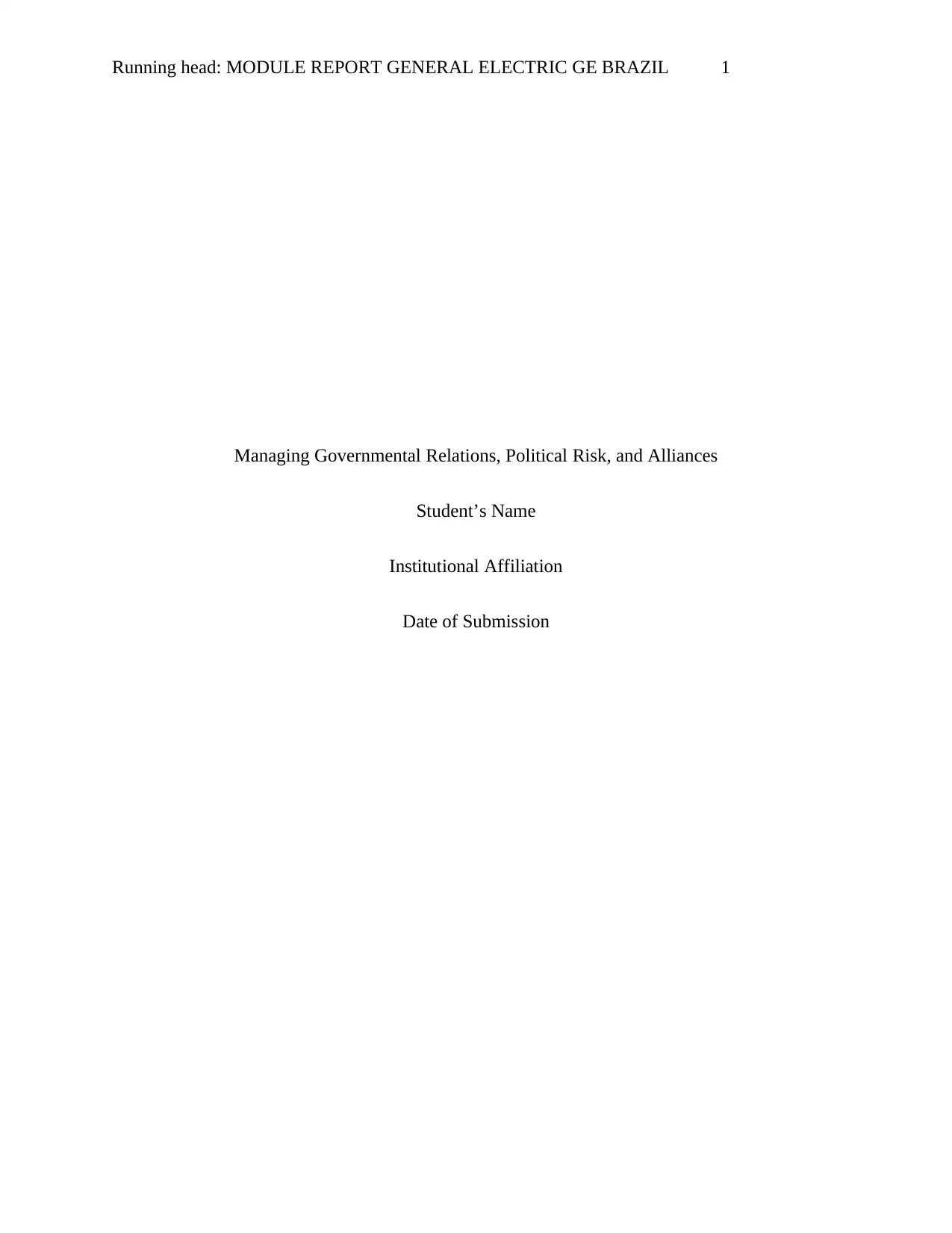
Running head: MODULE REPORT GENERAL ELECTRIC GE BRAZIL 1
Managing Governmental Relations, Political Risk, and Alliances
Student’s Name
Institutional Affiliation
Date of Submission
Managing Governmental Relations, Political Risk, and Alliances
Student’s Name
Institutional Affiliation
Date of Submission
Paraphrase This Document
Need a fresh take? Get an instant paraphrase of this document with our AI Paraphraser
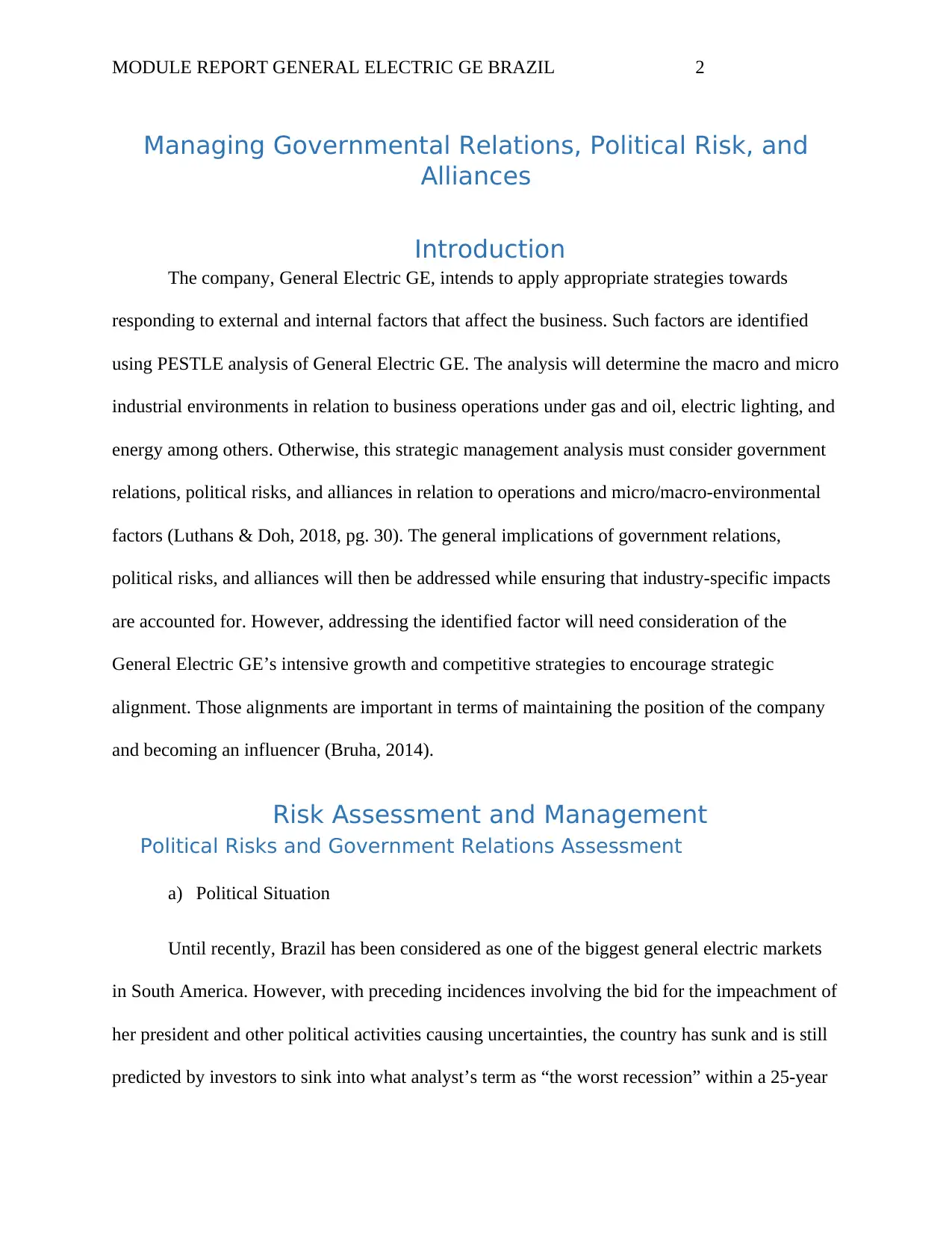
MODULE REPORT GENERAL ELECTRIC GE BRAZIL 2
Managing Governmental Relations, Political Risk, and
Alliances
Introduction
The company, General Electric GE, intends to apply appropriate strategies towards
responding to external and internal factors that affect the business. Such factors are identified
using PESTLE analysis of General Electric GE. The analysis will determine the macro and micro
industrial environments in relation to business operations under gas and oil, electric lighting, and
energy among others. Otherwise, this strategic management analysis must consider government
relations, political risks, and alliances in relation to operations and micro/macro-environmental
factors (Luthans & Doh, 2018, pg. 30). The general implications of government relations,
political risks, and alliances will then be addressed while ensuring that industry-specific impacts
are accounted for. However, addressing the identified factor will need consideration of the
General Electric GE’s intensive growth and competitive strategies to encourage strategic
alignment. Those alignments are important in terms of maintaining the position of the company
and becoming an influencer (Bruha, 2014).
Risk Assessment and Management
Political Risks and Government Relations Assessment
a) Political Situation
Until recently, Brazil has been considered as one of the biggest general electric markets
in South America. However, with preceding incidences involving the bid for the impeachment of
her president and other political activities causing uncertainties, the country has sunk and is still
predicted by investors to sink into what analyst’s term as “the worst recession” within a 25-year
Managing Governmental Relations, Political Risk, and
Alliances
Introduction
The company, General Electric GE, intends to apply appropriate strategies towards
responding to external and internal factors that affect the business. Such factors are identified
using PESTLE analysis of General Electric GE. The analysis will determine the macro and micro
industrial environments in relation to business operations under gas and oil, electric lighting, and
energy among others. Otherwise, this strategic management analysis must consider government
relations, political risks, and alliances in relation to operations and micro/macro-environmental
factors (Luthans & Doh, 2018, pg. 30). The general implications of government relations,
political risks, and alliances will then be addressed while ensuring that industry-specific impacts
are accounted for. However, addressing the identified factor will need consideration of the
General Electric GE’s intensive growth and competitive strategies to encourage strategic
alignment. Those alignments are important in terms of maintaining the position of the company
and becoming an influencer (Bruha, 2014).
Risk Assessment and Management
Political Risks and Government Relations Assessment
a) Political Situation
Until recently, Brazil has been considered as one of the biggest general electric markets
in South America. However, with preceding incidences involving the bid for the impeachment of
her president and other political activities causing uncertainties, the country has sunk and is still
predicted by investors to sink into what analyst’s term as “the worst recession” within a 25-year
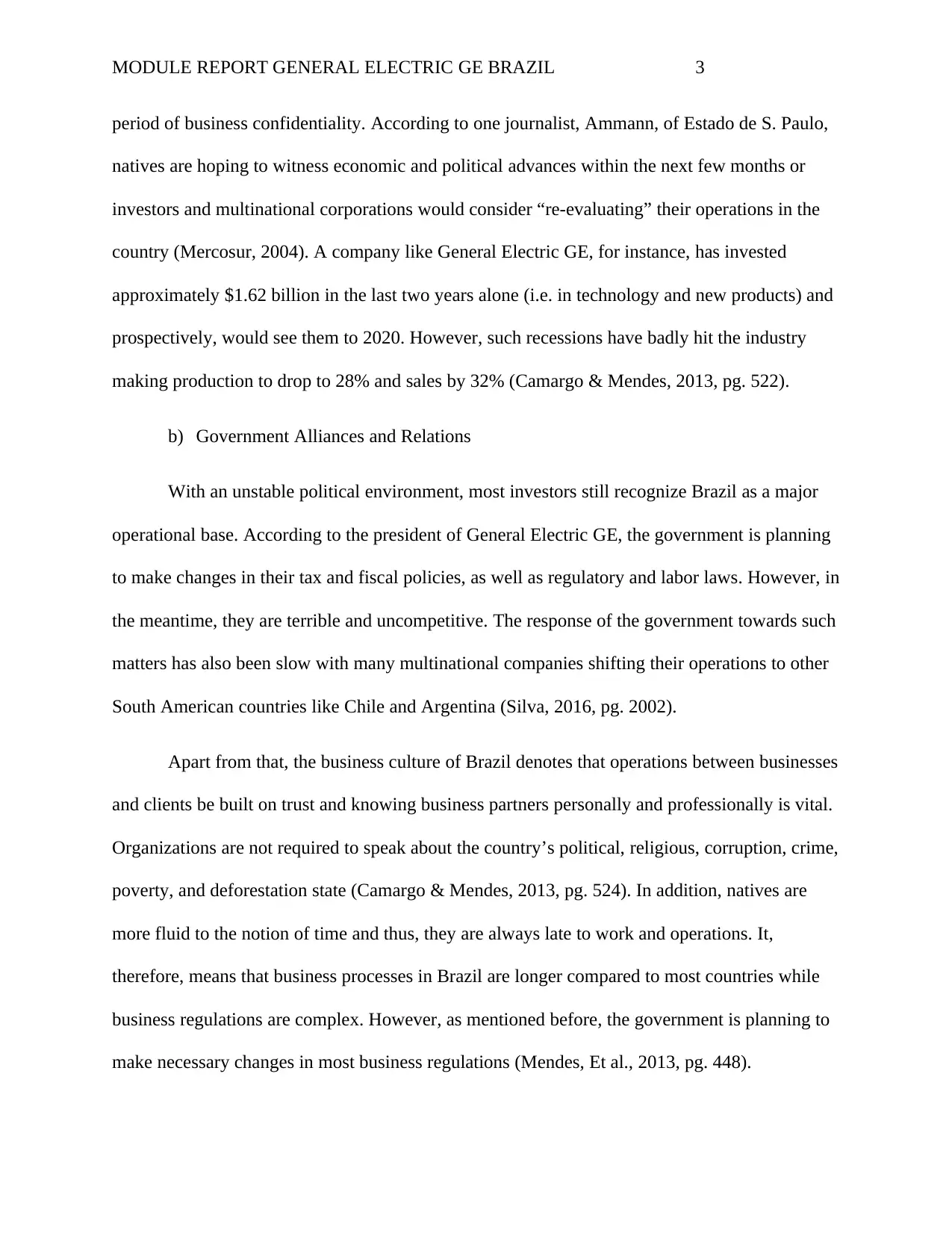
MODULE REPORT GENERAL ELECTRIC GE BRAZIL 3
period of business confidentiality. According to one journalist, Ammann, of Estado de S. Paulo,
natives are hoping to witness economic and political advances within the next few months or
investors and multinational corporations would consider “re-evaluating” their operations in the
country (Mercosur, 2004). A company like General Electric GE, for instance, has invested
approximately $1.62 billion in the last two years alone (i.e. in technology and new products) and
prospectively, would see them to 2020. However, such recessions have badly hit the industry
making production to drop to 28% and sales by 32% (Camargo & Mendes, 2013, pg. 522).
b) Government Alliances and Relations
With an unstable political environment, most investors still recognize Brazil as a major
operational base. According to the president of General Electric GE, the government is planning
to make changes in their tax and fiscal policies, as well as regulatory and labor laws. However, in
the meantime, they are terrible and uncompetitive. The response of the government towards such
matters has also been slow with many multinational companies shifting their operations to other
South American countries like Chile and Argentina (Silva, 2016, pg. 2002).
Apart from that, the business culture of Brazil denotes that operations between businesses
and clients be built on trust and knowing business partners personally and professionally is vital.
Organizations are not required to speak about the country’s political, religious, corruption, crime,
poverty, and deforestation state (Camargo & Mendes, 2013, pg. 524). In addition, natives are
more fluid to the notion of time and thus, they are always late to work and operations. It,
therefore, means that business processes in Brazil are longer compared to most countries while
business regulations are complex. However, as mentioned before, the government is planning to
make necessary changes in most business regulations (Mendes, Et al., 2013, pg. 448).
period of business confidentiality. According to one journalist, Ammann, of Estado de S. Paulo,
natives are hoping to witness economic and political advances within the next few months or
investors and multinational corporations would consider “re-evaluating” their operations in the
country (Mercosur, 2004). A company like General Electric GE, for instance, has invested
approximately $1.62 billion in the last two years alone (i.e. in technology and new products) and
prospectively, would see them to 2020. However, such recessions have badly hit the industry
making production to drop to 28% and sales by 32% (Camargo & Mendes, 2013, pg. 522).
b) Government Alliances and Relations
With an unstable political environment, most investors still recognize Brazil as a major
operational base. According to the president of General Electric GE, the government is planning
to make changes in their tax and fiscal policies, as well as regulatory and labor laws. However, in
the meantime, they are terrible and uncompetitive. The response of the government towards such
matters has also been slow with many multinational companies shifting their operations to other
South American countries like Chile and Argentina (Silva, 2016, pg. 2002).
Apart from that, the business culture of Brazil denotes that operations between businesses
and clients be built on trust and knowing business partners personally and professionally is vital.
Organizations are not required to speak about the country’s political, religious, corruption, crime,
poverty, and deforestation state (Camargo & Mendes, 2013, pg. 524). In addition, natives are
more fluid to the notion of time and thus, they are always late to work and operations. It,
therefore, means that business processes in Brazil are longer compared to most countries while
business regulations are complex. However, as mentioned before, the government is planning to
make necessary changes in most business regulations (Mendes, Et al., 2013, pg. 448).
⊘ This is a preview!⊘
Do you want full access?
Subscribe today to unlock all pages.

Trusted by 1+ million students worldwide
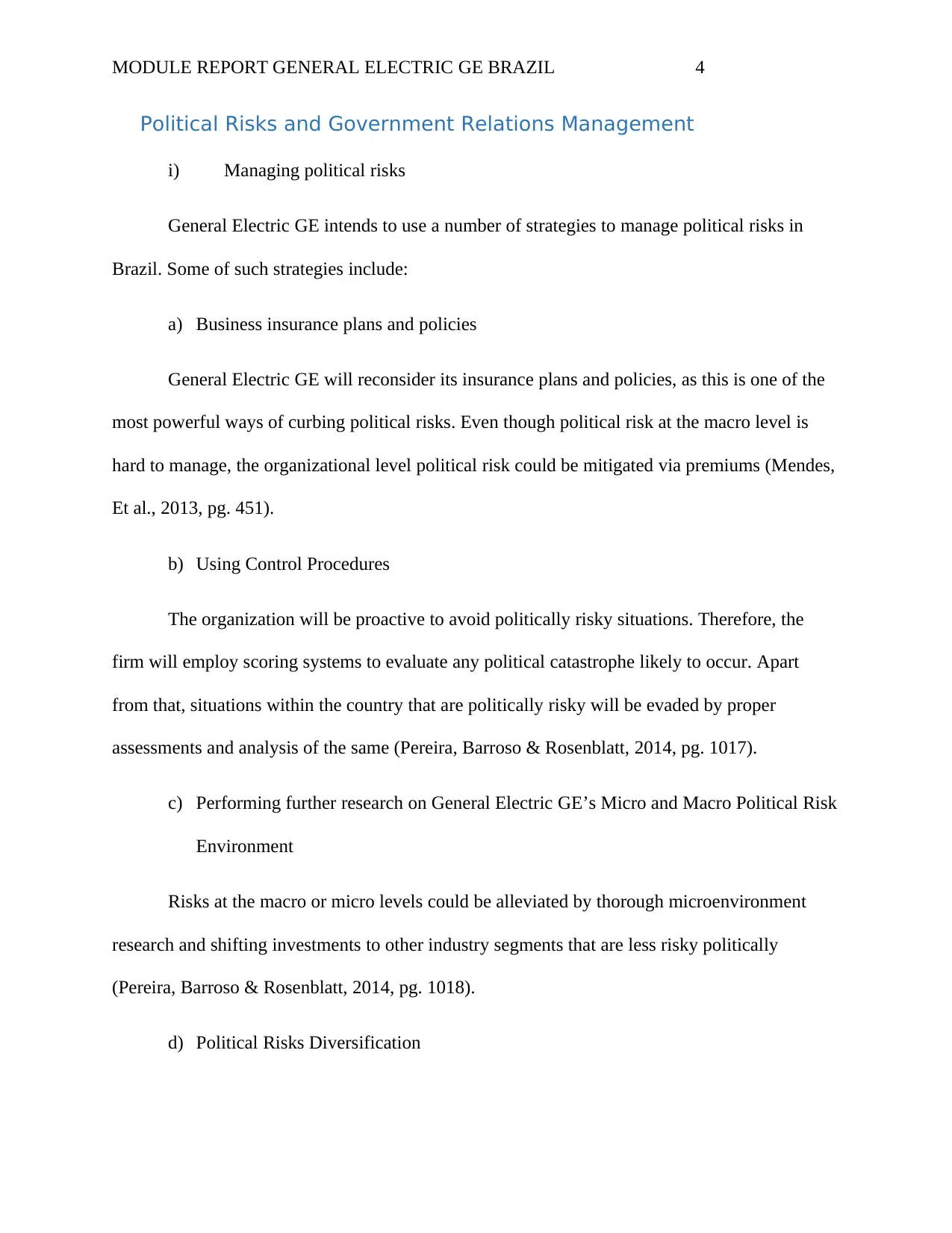
MODULE REPORT GENERAL ELECTRIC GE BRAZIL 4
Political Risks and Government Relations Management
i) Managing political risks
General Electric GE intends to use a number of strategies to manage political risks in
Brazil. Some of such strategies include:
a) Business insurance plans and policies
General Electric GE will reconsider its insurance plans and policies, as this is one of the
most powerful ways of curbing political risks. Even though political risk at the macro level is
hard to manage, the organizational level political risk could be mitigated via premiums (Mendes,
Et al., 2013, pg. 451).
b) Using Control Procedures
The organization will be proactive to avoid politically risky situations. Therefore, the
firm will employ scoring systems to evaluate any political catastrophe likely to occur. Apart
from that, situations within the country that are politically risky will be evaded by proper
assessments and analysis of the same (Pereira, Barroso & Rosenblatt, 2014, pg. 1017).
c) Performing further research on General Electric GE’s Micro and Macro Political Risk
Environment
Risks at the macro or micro levels could be alleviated by thorough microenvironment
research and shifting investments to other industry segments that are less risky politically
(Pereira, Barroso & Rosenblatt, 2014, pg. 1018).
d) Political Risks Diversification
Political Risks and Government Relations Management
i) Managing political risks
General Electric GE intends to use a number of strategies to manage political risks in
Brazil. Some of such strategies include:
a) Business insurance plans and policies
General Electric GE will reconsider its insurance plans and policies, as this is one of the
most powerful ways of curbing political risks. Even though political risk at the macro level is
hard to manage, the organizational level political risk could be mitigated via premiums (Mendes,
Et al., 2013, pg. 451).
b) Using Control Procedures
The organization will be proactive to avoid politically risky situations. Therefore, the
firm will employ scoring systems to evaluate any political catastrophe likely to occur. Apart
from that, situations within the country that are politically risky will be evaded by proper
assessments and analysis of the same (Pereira, Barroso & Rosenblatt, 2014, pg. 1017).
c) Performing further research on General Electric GE’s Micro and Macro Political Risk
Environment
Risks at the macro or micro levels could be alleviated by thorough microenvironment
research and shifting investments to other industry segments that are less risky politically
(Pereira, Barroso & Rosenblatt, 2014, pg. 1018).
d) Political Risks Diversification
Paraphrase This Document
Need a fresh take? Get an instant paraphrase of this document with our AI Paraphraser
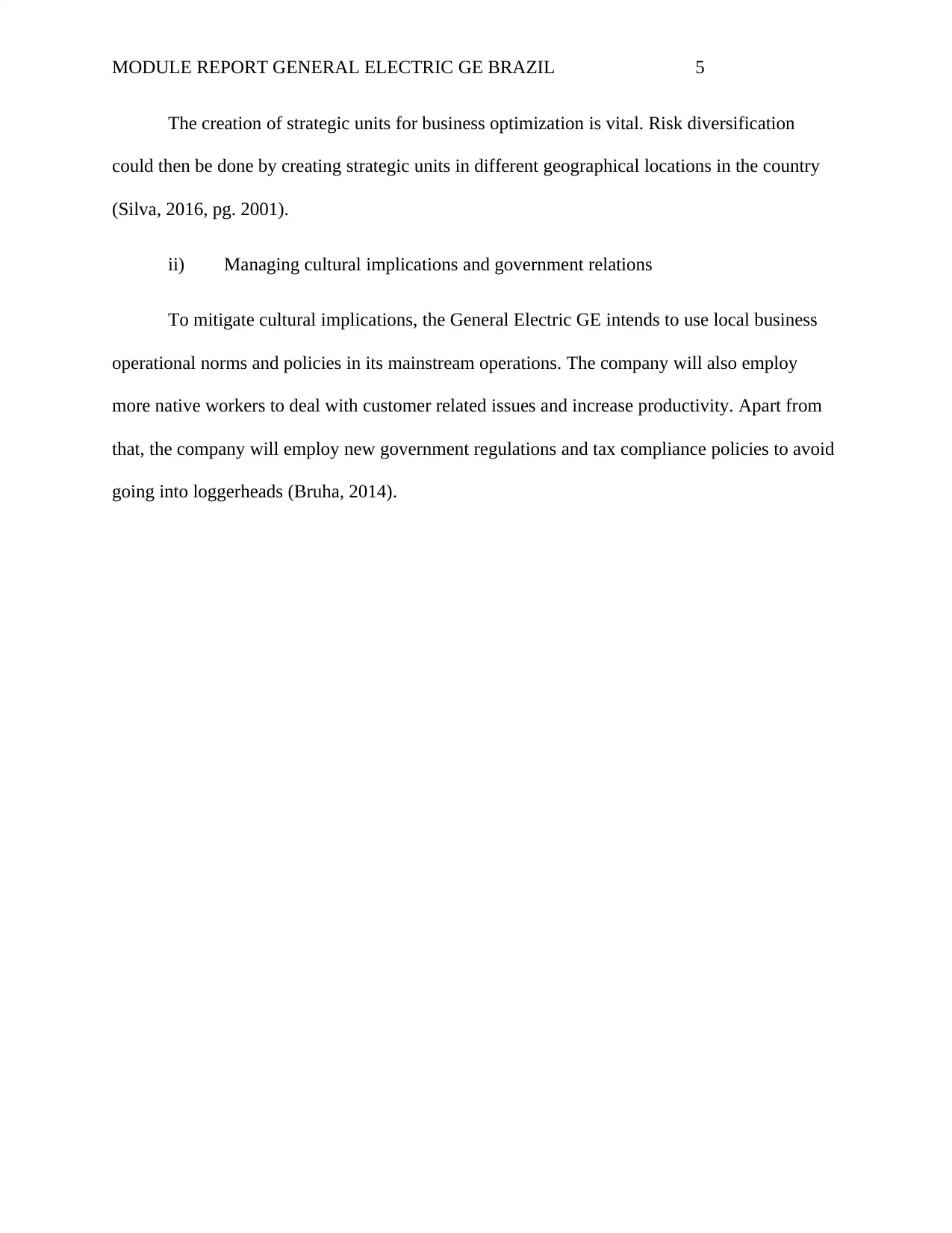
MODULE REPORT GENERAL ELECTRIC GE BRAZIL 5
The creation of strategic units for business optimization is vital. Risk diversification
could then be done by creating strategic units in different geographical locations in the country
(Silva, 2016, pg. 2001).
ii) Managing cultural implications and government relations
To mitigate cultural implications, the General Electric GE intends to use local business
operational norms and policies in its mainstream operations. The company will also employ
more native workers to deal with customer related issues and increase productivity. Apart from
that, the company will employ new government regulations and tax compliance policies to avoid
going into loggerheads (Bruha, 2014).
The creation of strategic units for business optimization is vital. Risk diversification
could then be done by creating strategic units in different geographical locations in the country
(Silva, 2016, pg. 2001).
ii) Managing cultural implications and government relations
To mitigate cultural implications, the General Electric GE intends to use local business
operational norms and policies in its mainstream operations. The company will also employ
more native workers to deal with customer related issues and increase productivity. Apart from
that, the company will employ new government regulations and tax compliance policies to avoid
going into loggerheads (Bruha, 2014).
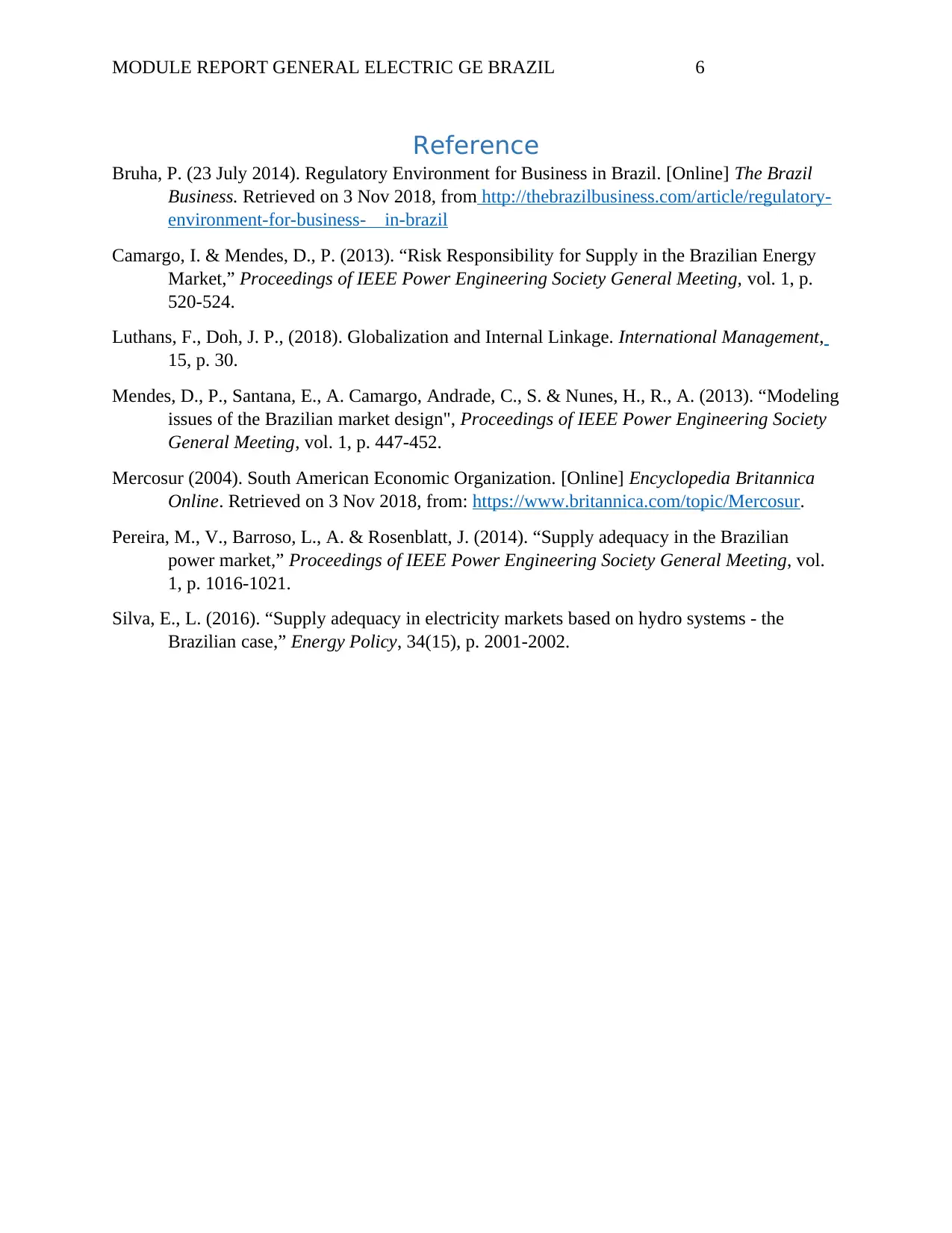
MODULE REPORT GENERAL ELECTRIC GE BRAZIL 6
Reference
Bruha, P. (23 July 2014). Regulatory Environment for Business in Brazil. [Online] The Brazil
Business. Retrieved on 3 Nov 2018, from http://thebrazilbusiness.com/article/regulatory-
environment-for-business- in-brazil
Camargo, I. & Mendes, D., P. (2013). “Risk Responsibility for Supply in the Brazilian Energy
Market,” Proceedings of IEEE Power Engineering Society General Meeting, vol. 1, p.
520-524.
Luthans, F., Doh, J. P., (2018). Globalization and Internal Linkage. International Management,
15, p. 30.
Mendes, D., P., Santana, E., A. Camargo, Andrade, C., S. & Nunes, H., R., A. (2013). “Modeling
issues of the Brazilian market design", Proceedings of IEEE Power Engineering Society
General Meeting, vol. 1, p. 447-452.
Mercosur (2004). South American Economic Organization. [Online] Encyclopedia Britannica
Online. Retrieved on 3 Nov 2018, from: https://www.britannica.com/topic/Mercosur.
Pereira, M., V., Barroso, L., A. & Rosenblatt, J. (2014). “Supply adequacy in the Brazilian
power market,” Proceedings of IEEE Power Engineering Society General Meeting, vol.
1, p. 1016-1021.
Silva, E., L. (2016). “Supply adequacy in electricity markets based on hydro systems - the
Brazilian case,” Energy Policy, 34(15), p. 2001-2002.
Reference
Bruha, P. (23 July 2014). Regulatory Environment for Business in Brazil. [Online] The Brazil
Business. Retrieved on 3 Nov 2018, from http://thebrazilbusiness.com/article/regulatory-
environment-for-business- in-brazil
Camargo, I. & Mendes, D., P. (2013). “Risk Responsibility for Supply in the Brazilian Energy
Market,” Proceedings of IEEE Power Engineering Society General Meeting, vol. 1, p.
520-524.
Luthans, F., Doh, J. P., (2018). Globalization and Internal Linkage. International Management,
15, p. 30.
Mendes, D., P., Santana, E., A. Camargo, Andrade, C., S. & Nunes, H., R., A. (2013). “Modeling
issues of the Brazilian market design", Proceedings of IEEE Power Engineering Society
General Meeting, vol. 1, p. 447-452.
Mercosur (2004). South American Economic Organization. [Online] Encyclopedia Britannica
Online. Retrieved on 3 Nov 2018, from: https://www.britannica.com/topic/Mercosur.
Pereira, M., V., Barroso, L., A. & Rosenblatt, J. (2014). “Supply adequacy in the Brazilian
power market,” Proceedings of IEEE Power Engineering Society General Meeting, vol.
1, p. 1016-1021.
Silva, E., L. (2016). “Supply adequacy in electricity markets based on hydro systems - the
Brazilian case,” Energy Policy, 34(15), p. 2001-2002.
⊘ This is a preview!⊘
Do you want full access?
Subscribe today to unlock all pages.

Trusted by 1+ million students worldwide
1 out of 6
Your All-in-One AI-Powered Toolkit for Academic Success.
+13062052269
info@desklib.com
Available 24*7 on WhatsApp / Email
![[object Object]](/_next/static/media/star-bottom.7253800d.svg)
Unlock your academic potential
Copyright © 2020–2025 A2Z Services. All Rights Reserved. Developed and managed by ZUCOL.